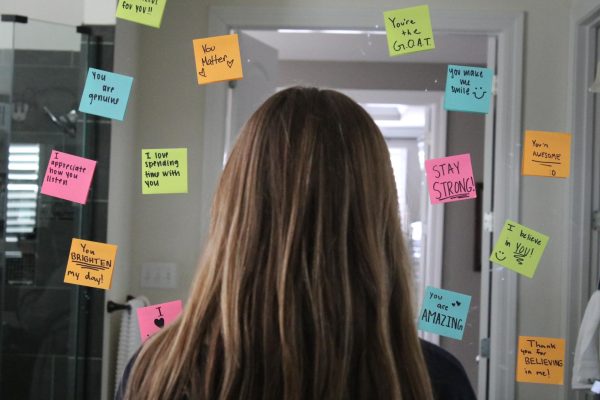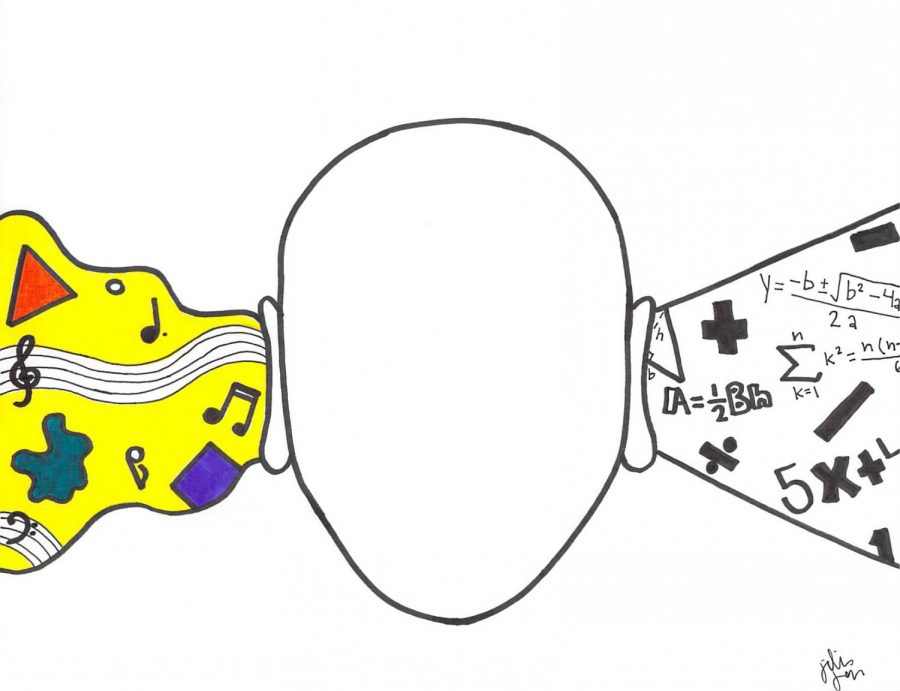Is Music a Friend or a Foe in Classrooms?
Media by Jilian Bunderson
Consumers in the United States spend an average of 24 hours a week listening to music, and according to a Kaiser Family Foundation poll, statistics show that 87 percent of students prefer listening to music while they are working.
Amy Belfi, assistant professor at the Missouri University of Science and Technology, gives three main factors on whether background music is beneficial or harmful for students and their studies: the individual person, the type of assignment and the type of music.
Belfi explains that some individuals prefer listening to music, while others do not. The reasoning behind an individual’s preference to music could come from musical experience, personality or other variables.
Belfi said that often times music can be linked to certain memories throughout a lifetime such as the song played at an important event or celebration like a wedding or graduation party. Upon hearing a song, certain senses of the sounds, feelings and touch of that moment could flow in. Music evokes emotions that bring memories.
“If you’ve ever taken a foreign language, maybe you learned some songs to help you memorize the conjugations of certain verbs. Or even the ABC song,” said Belfi, “So we all have experienced the benefit of music on memory, but in terms of how, that is the trickier question.”
There are hundreds of different types of music genres in the world: rock, pop, classical, indie and more. Each genre creates a different rhythm and atmosphere and can impact the work put forth in a student. Though Belfi intends on creating an experiment with this ideology soon, she gives her hypothesis on the fact that more lyrical and familiar music may be more distracting due to the undying urge to sing along or listen to the catchy song that you oh so adore. Some music genres, may be more beneficial than others.
Morgan Sirota, sophomore, tends to listen to music while doing schoolwork and working on homework. Though she prefers doing chemistry with no music to allow her to think further.
“I listen to music every time because otherwise I get distracted by things. It keeps me focused,” said Morgan. During classes that don’t allow earbuds whilst working, Morgan said, “It does impact me. I don’t like it to be totally silent and I’m more prone to distractions when I don’t have the opportunity to listen to music.”
Jason Winter, choir teacher, said he gives students the chance to listen to music when working independently. As a choir teacher, he is passionate about music and said that, “silence is deafening.” Winter personally prefers to listen to some kind of noise while he is working in order to gain a focus flow.
Rebecca Blindauer, theater teacher, said she allows students to listen to music in her classroom while working because for some students, listening to music helps them work better and remain diligent.
“It also works for me,” she said. “Listening to music while doing a multitude of activities helps to keep me focused and energized.”
Some teachers disagree with the use of music in the classroom. Brendan Taylor, social studies teacher, said music in the classroom is a distraction, and he doesn’t allow it unless during his lesson plans involving historical music from that decade.
“You’re trying to create proper habits for kids to retain information and knowledge, and music interrupts that process,” Taylor said.
He said classical music is more acceptable than rock or lyrical songs.
In fact, a well- known study called the Mozart Effect, found that listening to Mozart before an important task may actually improve the brain’s solving abilities and overall productivity. A group of students listened to 10 minutes of Mozart before a test while another group listening to 10 minutes of silence. Afterwards, the group listening to Mozart had more significant and successful test scores.
But, as Taylor said, “Nobody is listening to Bach.”
Your donation will support the student journalists of Marquette High School. Your contribution will allow us to purchase equipment and cover our annual website hosting costs. You may become a PATRON by making a donation at one of these levels: White/$30, Green/$50, Blue/$100. Patron names will be published in the print newsmagazine, on the website and once per quarter on our social media accounts.

Molly Sillitto, junior, is the Opinions Editor for the Marquette Messenger. This will be her second year on staff. Molly likes to listen to music, go outside...

Jilian Bunderson, senior, is the Illustrator for the Messenger. She is also the co-president of Renaissance, a member of NHS, and has been involved in...







